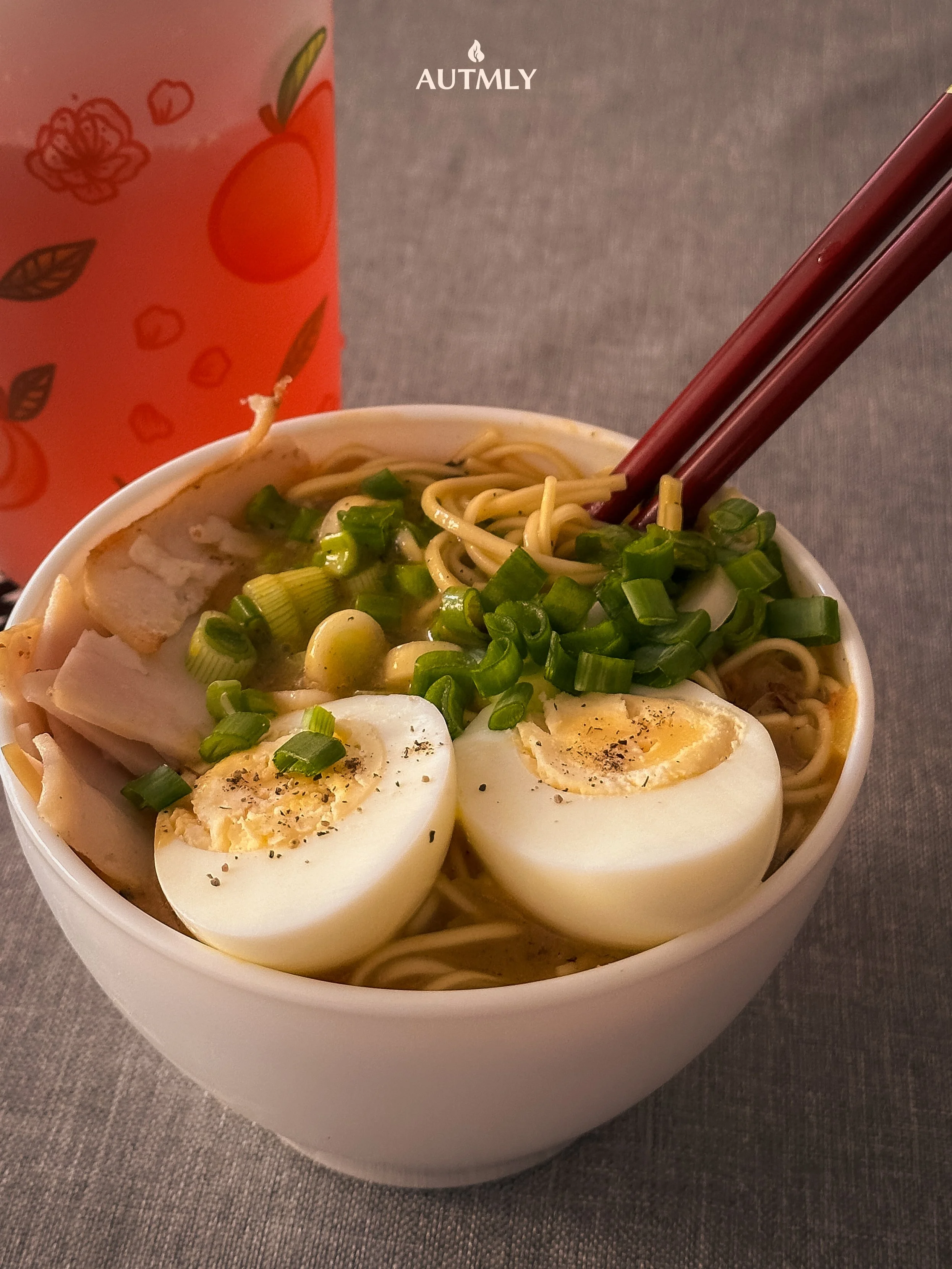Comfort Food: How Our Favorite Meals Soothe the Soul
Original image, taken and owned by Autmly
We’ve all been there: you suffer a long, stressful day, the air hangs cold, and you crave not just food - but something warm, hearty, familiar. Maybe it’s a bowl of soup, a steaming pasta, a casserole or a plate of mashed potatoes. It’s not just about filling your stomach. It’s about feeling comforted.
We each carry within us a handful of meals that do more than feed our bodies. They feed something deeper, something that science is only beginning to understand but that we've known intuitively all along. These are the meals that soothe our souls, and their power lies not in their ingredients, but in what they awaken within us.
What is “Comfort Food”?
Broadly speaking, comfort foods are those that provide psychological comfort - they often evoke nostalgia, familiarity, emotional soothing, or memories of home.
When you eat a meal connected to positive memories, your hippocampus (the part of your brain that stores your life's story) lights up in recognition. Your sense of smell and taste are uniquely wired to this memory center, which is why a single bite can transport you across decades in an instant. That bowl of chicken soup doesn't just warm your body; it carries you back to your grandmother's kitchen, to being seven years old and cared for, to a time when the world felt safe and manageable.
The University of Southampton discovered something remarkable about this connection between memory and comfort: when people recalled nostalgic memories, they didn't just feel emotionally warmer, they actually perceived the room temperature as higher. Their bodies responded to memories as if they were physical warmth. Your favorite meals offer this same alchemy, turning memory into tangible comfort.
The Soul’s Language
Your soul speaks in sensations, not words. It understand the weight of a warm bowl in your hands, the steam that rises to meet your face, the first taste that makes you close your eyes without thinking. These sensory experiences bypass your rational mind entirely and speak directly to your emotional core.
This is why simply thinking about your favorite comfort food triggers a dopamine release in your brain. Your soul recognizes what's coming - not just calories, but care. Research from 2024 shows that this dopamine response affects far more than mood. It influences your stress levels, your sense of focus, even how your body digests food.
When chronically stressed women in one study were allowed to eat comfort foods, their stress hormone levels measurably decreased. Their bodies weren't being fooled or indulging in empty pleasure. They were engaging in a form of emotional regulation as old as humanity itself - using food as a bridge back to equilibrium, back to feeling like themselves again.
Why Warm Meals Feel Especially Comforting
Why is it that warm foods specifically seem to offer such profound comfort? Part of it is purely sensory - warmth activates different neural pathways than cold foods, creating immediate physical relaxation. But they also have a psychological impact.
In cultures worldwide, warm meals are associated with care and nourishment. The act of cooking something warm for someone (or for yourself) is an expression of tenderness. It requires time, attention and it can't be rushed. In our fast-paced world, a warm meal is inherently a slow meal, inviting us to pause and be present.
Also, those meals are often tied to memories like childhood dinners, family gatherings, seasonal traditions, etc. The scent of warming food triggers the olfactory bulb and limbic system - the brain’s memory and emotion centre, which in turn evokes a sense of belonging and safety.
So when you serve a steaming dish, you’re not just feeding hunger - you’re activating emotional circuits by smell, warmth and familiarity.
More Than Hunger
When you’re genuinely hungry, your body sends clear signals: low blood sugar, stomach growling, low energy. A warm meal helps with that. But comfort meals are often chosen not for calorie needs, but for emotional or physical soothing.
Comfort food consumption is often rooted in social experiences like family dinners, cultural celebrations or meals shared during milestones. When we eat these foods, even by ourselves, we're mentally reconnecting with those relationships.
Research from 2015 found that people with strong social bonds preferred comfort food more intensely when feeling isolated. The food became a tangible link to connection, a way of bringing loved ones close even when physically apart. And not just loved ones. The consumption of these meaningful foods creates what researchers call "identity continuity" - a sense that your past self and present self are connected, that you belong to something larger than this moment.
Tips for Mindful Comfort Eating
Understanding how our favorite meals work their quiet magic offers us gentle guidance for deepening their impact.
Honor the ritual of preparation When your soul feels frayed, the act of cooking your favorite meal can begin the healing before you even eat. Research shows that the scent of familiar ingredients and the familiar steps of a beloved recipe can activate memory and emotion in profound ways. The cooking itself becomes a form of meditation, a way of saying to yourself: I'm worth this time and care.
Create sacred space around eating Your soul responds to ritual. Light a candle, use your favorite bowl, sit at the table rather than in front of a screen. Studies confirm that comfort foods tied to specific contexts and rituals provide deeper emotional benefits. You're not just eating - you're creating a moment that honors both the meal and yourself.
Let the meal tell its story As you eat, let yourself remember. Where did this meal come from? Who taught it to you? What moment in your life does it recall? Research shows that engaging consciously with food memories deepens both the nostalgic experience and its comforting effects. You're not being indulgent; you're being intentional.
Trust your body about what it needs Studies have found that for those prone to emotional eating, comfort foods genuinely do improve mood during consumption. Your soul knows what it needs. Rather than judging your cravings, listen to them. What is this particular meal offering you right now?
Choose warmth when you feel down On days when the world feels harsh, warm foods offer more than taste. The physical sensation of warmth activates feelings of safety and being cared for. Keep simple recipes accessible - a mug of soup, a slice of warm bread, tea with honey. These small acts of warmth are small acts of self-love.
Comfort food is part of a state of being. The next time you find yourself drawn to a particular meal, pause and listen. What is that food offering you? What memory is it holding? What part of you is it trying to nourish?
In a world that often asks us to move faster, to do more, to be relentlessly productive, comfort food whispers a different invitation: to slow down and reconnect.
Thank you for reading and I hope I see you next time. 🍂
Keep your heart cozy - no matter the season.
——————————————————————————
Sources for this article:
Dallman et al. (2003) - Chronic Stress and Obesity: A New View of "Comfort Food"
Tomiyama, Dallman & Epel (2011) - Comfort Food is Comforting to Those Most Stressed
Nutrition & Food Service Edge Journal (January-February 2024) - "The Brain Science Behind Comfort Foods"
van Strien et al. (2019) - Is Comfort Food Actually Comforting for Emotional Eaters?
Lin, F. Y. (2024) - Comfort Food for Generation Z: A Case Study in Taiwan
Simpson et al. (2024) - 'Nostalgic Food Heals for Us': A Qualitative Exploration
Yasmeen, Iftikhar & Fischer (2024) - Culinary Comfort: Understanding the Connection between Food and Well-Being
Troisi & Gabriel (2015) - Threatened Belonging and Preference for Comfort Food
Zhou et al. (2012) - Nostalgia: The Gift That Keeps on Giving



